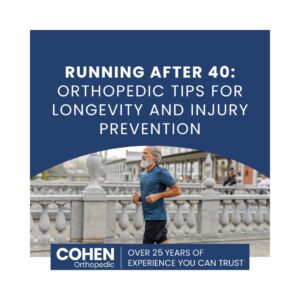These Eight Things Can Help Prevent Age-Related Joint Pain

Can You Avoid Age-Related Joint Pain?
While we can’t completely halt the aging process, there are many strategies that can significantly reduce the likelihood of experiencing joint pain. Let’s look at what you can do to protect your joints and minimize discomfort as you age.
1. Stay Active
One of the most important things you can do to protect your joints is to stay physically active. Regular movement helps keep your joints flexible, improves circulation, and strengthens the muscles around the joints, providing them with more support.
- Low-impact exercises like walking, swimming, cycling, and using an elliptical machine are gentle on the joints while still providing excellent cardiovascular benefits.
- Strength training is essential for building and maintaining muscle mass, which helps stabilize and protect the joints.
- Stretching and flexibility exercises such as yoga or Pilates can help improve joint mobility and prevent stiffness.
Strengthening the muscles around your joints helps reduce the load on the bones and cartilage, making it less likely for wear and tear to occur.
2. Maintain a Healthy Weight
Excess weight puts additional stress on your joints, particularly those that bear weight, such as the knees, hips, and lower back. Reducing excess body fat can alleviate some of the pressure on your joints, preventing or slowing the progression of joint pain.
If you’re overweight or obese, losing even a small amount of weight can significantly reduce the strain on your joints and improve mobility. For every pound of weight lost, it’s estimated that the load on your knees is reduced by about four pounds.
3. Eat a Joint-Friendly Diet
What you eat can have a significant impact on your joint health. A balanced diet rich in nutrients that support joint function and fight inflammation is key.
- Anti-inflammatory foods: Incorporate foods like fatty fish (salmon, mackerel, sardines), nuts, seeds, olive oil, and leafy green vegetables, all of which are rich in omega-3 fatty acids, antioxidants, and polyphenols—substances that can help reduce joint inflammation.
- Vitamin D and Calcium: These nutrients are essential for bone health. Calcium is needed for strong bones, while Vitamin D helps your body absorb calcium. Foods like dairy products, fortified plant milks, leafy greens, and sunlight exposure can provide these essential nutrients.
- Collagen-rich foods: Bone broth, chicken, and other collagen-rich foods help support the cartilage and connective tissues around your joints. Collagen supplements have also become popular for joint health.
- Ginger and Turmeric: These spices have natural anti-inflammatory properties that can help reduce joint pain and stiffness.
4. Practice Good Posture
Poor posture can increase the strain on certain joints, leading to pain and discomfort. Whether you’re standing, sitting, or sleeping, maintaining proper alignment is key to avoiding unnecessary joint stress.
- Standing: Keep your shoulders back and your hips aligned with your feet. Avoid locking your knees when standing for long periods.
- Sitting: Sit all the way back in your chair with your feet flat on the floor and your knees at a 90-degree angle. Avoid slouching or hunching forward, which can put additional strain on your spine and joints.
- Sleeping: Use a supportive mattress and pillows to keep your spine aligned. Avoid sleeping on your stomach, as this can strain your neck and back.
5. Protect Your Joints from Injury
Injuries to your joints—whether from sports, accidents, or everyday wear and tear—can increase the risk of developing joint pain later in life. Taking steps to protect your joints can make a big difference.
- Use proper techniques when lifting, bending, or engaging in physical activity to avoid straining your joints.
- Wear supportive footwear: Choose shoes with proper arch support and cushioning to reduce stress on your feet, knees, and hips.
- Take breaks: If you’re engaged in repetitive tasks or sitting for long periods, take breaks to stretch and move around.
6. Consider Supplements
Certain supplements may help support joint health and reduce pain or inflammation. Before starting any supplement regimen, always consult your doctor.
- Glucosamine and Chondroitin: These compounds are found in cartilage and may help support joint health and reduce symptoms of osteoarthritis.
- Omega-3 fatty acids: Found in fish oil, omega-3s can help reduce inflammation and support overall joint health.
- Turmeric/Curcumin: Known for its anti-inflammatory properties, turmeric may help alleviate joint pain and stiffness.
7. Get Regular Checkups
Regular medical checkups can help catch any potential joint problems early, especially if you have a family history of joint issues or conditions like arthritis. Early intervention with physical therapy, medications, or lifestyle changes can help prevent more severe pain later.
8. Manage Stress
Chronic stress can exacerbate inflammation in the body, contributing to joint pain. Practices like mindfulness meditation, deep breathing, or engaging in relaxing activities can help manage stress and, in turn, reduce joint-related inflammation.
Final Thoughts
While age-related joint pain is common, it doesn’t have to be a foregone conclusion. By staying active, maintaining a healthy weight, eating a nutritious diet, and protecting your joints from unnecessary strain, you can greatly reduce your risk of joint pain as you age. If joint pain does arise, there are plenty of treatments and interventions to manage it, from physical therapy and medications to lifestyle adjustments.
Remember: it’s never too early—or too late—to start taking care of your joints. The choices you make today can lead to greater comfort and mobility in the years ahead.
What are some of the ways you protect your joints? Let us know in the comments!










